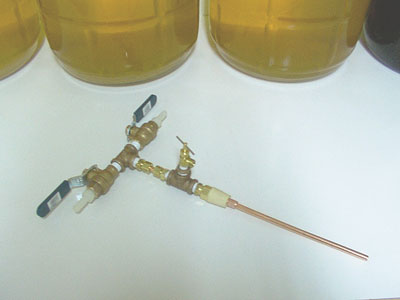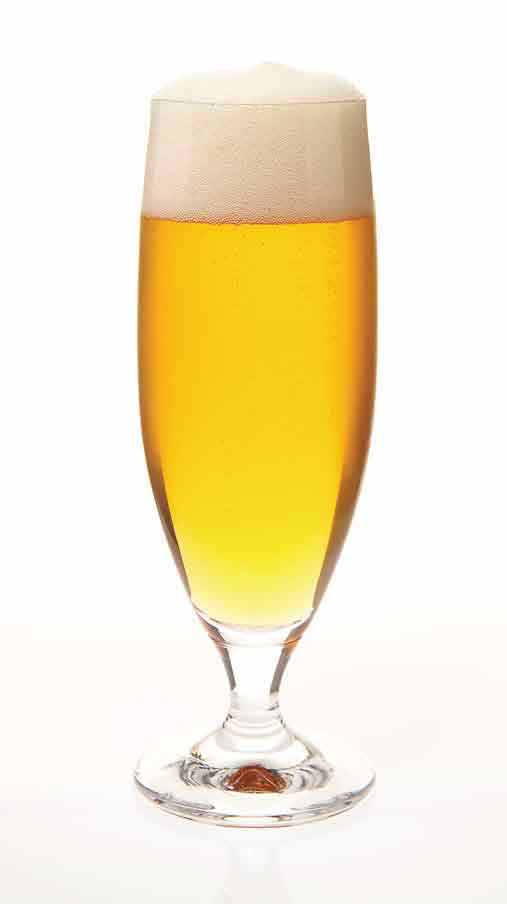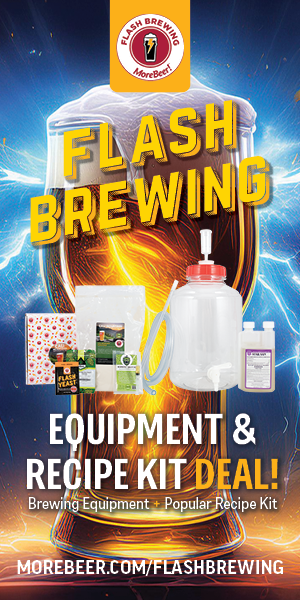Don’t miss our New England Beer & Baseball adventure in 2026! Click here to register!
November 2005
Want to build your own quarter or half-barrel brewing system? We’ll take you step-by-step from stainless steel tubes to a sturdy stand for a three-vessel brewing system capable of brewing 5 to 13-gallon (19-49 L) batches of beer.
In this issue
-

-
mr-wizard
Denatured Enzymes
-
mr-wizard
Mashing Enzymes
-
 recipe
recipeWild Blossom Meadery’s Blanc de Fleur clone
This mead is best when aged six months or more. Bottle the mead still (uncarbonated).
-
 recipe
recipeRedstone Meadery Vanilla Bean – Cinnamon Stick Mead Clone
One of the traditions I started early in my meadmaking career was producing Winter Solstice Mead. Every December 21st, I make mead. For many years I would make a 10-gallon (38 L) batch leaving half of it traditional and half with either vanilla beans or vanilla beans and cinnamon sticks. I would age it two years and then serve it at the annual Winter Solstice party from a special bottle. Serve 3-6 ounces at a time, very cold or mulled. — David Myers
-
 recipe
recipeRabbit’s Foot Meadery’s Sweet Mead clone
This mead is sweet… just like you (awww). And it’s award-winning!
-
 recipe
recipePiatz’s Historic Porter
Steve Piatz of Eagan, Minnesota won 1st place in the 1999 AHA National Homebrew Competition in the Historic/Experimental category. This beer was an attempt to create the historic, wood-aged, stale porter from the glory days of the style in London.
— Steve Piatz -
 recipe
recipeNumber 9 (Orange Blossom Honey Mead)
This mead is not as sweet (or alcoholic) as a sweet mead, but retains enough sweetness to round out the orange blossom honey’s characteristics. The Lalvin D-47 yeast is used by winemakers for fermenting dry or off-dry white wines. I used the “no heat” method described in Ken Schramm’s book, “The Compleat Meadmaker” (2003, Brewers Publications) and held my breath, but everything turned out fine. In the no heat method, you don’t heat the must, add sulfite or do anything to sanitize the must — you just mix up the honey and water and let ‘er rip. You can add more or less acid to suit your own taste.
– Chris Colby -
 recipe
recipeZocco’s Sweet Mead
Paul Zocco was the 2003 National Meadmaker of the Year and 2001-2004 New England Meadmaker of the Year.
-
 project
projectBuild a Counter-Pressure Bottle Filler: Projects
Want to bottle sediment-free beer from your keg? With an hour of your time and $30 worth of parts, you can make your own counter-pressure bottle filler.
-
 article
articleTransferring Beer
How to get your beer from here to there without the air. Learn different ways to move wort or beer in your home brewery.
-
 article
articleDealing with Diacetyl: Tips from the Pros
We butter up three professional brewers and get them to dispense knowledge on dealing with dreaded diacetyl.
-
 project
projectBuilding a Weldless Boil Kettle or Mash Tun
Turn a Sanke keg into a boil kettle or mash tun without picking up a welder’s torch. Our solution for converting a kicked keg into a killer piece of brewing equipment.
-
 project
projectBuilding 3 Tiers to Beer
Want to build your own quarter or half-barrel brewing system? We’ll take you step-by-step from stainless steel tubes to a sturdy stand for a three-vessel brewing system capable of brewing 5 to 13-gallon (19-49 L) batches of beer.
-
 article
articleMead Clone Recipes
We present 3 great mead clone recipes from Redstone, Rabbit’s Foot and Wild Blossom meaderies. And, where to send your potential medal-winning meads.
-
 article
articleMead: From Nectar to Nirvana
Flowers make nectar. Bees make honey…and homebrewers make mead. Or, at least they can after reading our primer on making the “nectar of the gods.” Plus: sweet and semi-sweet mead recipes
-
article
10 Things Homebrewers Need to Try
Get your homebrew fires burning with one (or more) of our 10 things to try to expand your brewing horizons.

